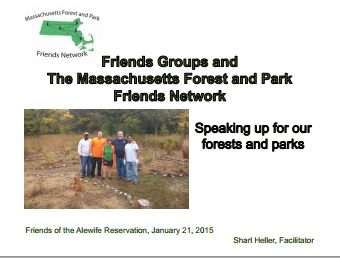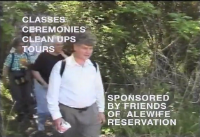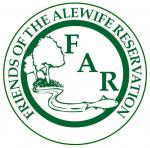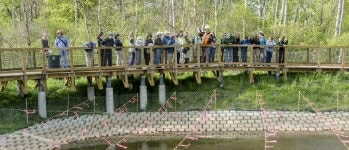Watershed leaders and MWRA Oppose Elimination of US-EPA as Primary Oversight Agency for storm and waste water disposal process and enforcement.
By Ellen Mass
To date US-EPA continues to oversee Massachusetts waterways standards for water quality, storm and waste water discharge and a host of other Clean Water Act requirements begun in 1978 and now manifest in NPDES of the US-EPA which has been on the books since 2003. Many watershed experts testified today in front of a concerned Committee on Natural Resources made up of legislators.
The Watershed organizations and some state agencies asked that the federal agency remain as overseer and continue working with Dept. of Environmental Protection (DEP) as they have done thus far over the years to try and keep Ma. environment sustainable and beautiful. Many watersheds are already unable to meet basic water quality standards because of DEP’s back log of work unattended, lack of personnel and slashed budgets.
Westport Watershed Council testimony with fishing industry leaders reporting on high nitrogen counts ruining coast line habitat and fishing conditions, and expressed lack of support for their nitrogen reducetion remedies implemented to keep the counts down for coastline survival. Already 50 percent of Ma. Waterways do not meet water quality standards. By removing EPA from oversight, NPDES compliance would be lessened and waterbodies would increase contamination at a time of climate change when flooding Is unpredicatable with substantially increased precipitation, and future surges and sea rise.
Connecticut River Watershed Council says DEP has the managerial capacity but needs a “gold plated program” which requires high standards and a definitive criteria for their permit and enforcement determinations. Much more monitoring would need to be done, and state budgets are presently cut ‘to the bone’ to give the entire responsibility to an ailing agency. At present, no “bench marking” is seen by DEP with measured outcomes for water quality and general environmental changes to the landscape. Steven Silva of the Taunton River Watershed Association, former EPA expert noted the Commonwealth “Fix It” approach must be attempted which now ameliorates water-based problems with NPDES, which, according to Silva, is the best Clean Water Act program that exists and should not be diminished from the good results of the 80s and 90s when NPDES programs addressed nitrogen, a complex program which was successful in pollution elimination. However, these programs need trained and experienced professionals, not contractors. Silva administered NPDES for 10 years in a number of New England states. He emphasized the importance of adequate water quality monitoring in any type of benchmark program. Assessments of program results are usually absent with state only approach. Good examples of Ma. cleanup work was in western Ma. In 2008-09 with substantial reduction of pollution, with polluters being shut down. Connecticut and Vermont have been operating well with NPDES as has R.I. Ma. DEP however, has received a legal status of D recently. And while many states also opted out of NPDES, 38 of them have petitioned to be let back into the program with a permit.
Andrea Downs of Mass Water Resources Authority (MWRA) shared her skepticism that the state should be “primary” in the oversight and enforcement work that US-EPA has been doing without cost to the state estimated at over 10million. Each testifier noted the unstable funding proposal for DEP for half of what was proposed as needed (4.8 million)to keep up environmental standards of the Clean Water Act in Ma. MWRA depends on DEP’s ability to keep up with waterways requirements in order to protect the public from dangerous bacteria and to keep state municipal infrastructures functioning in adequate condition.
Robert Zimmerman of the Charles River Watershed Assoc. referred to former state environmental head, John De Villars who enforced cleanup and assisted to make Ma. a model for other states. While the costs are higher at the beginning, they come down over time. The US-EPA MS4 permit which is the most challenging in Ma. would assist more readily with flash flooding and drought conditions, which the DEP may not be able to manager with a limited budget and diminishment of personnel. With the unparalleled growth in Boston, the problems of the Lower Basin (Charles and Mystic watersheds) are deeply impacted and require great resources, lacking in the state. Throwing federal resources and enforcement out does not seem logical. EPA has documented its fact sheets with solid science on the NPDES requirements for Ma. as a result of Ma. retaining the program until the present; the Assabet has been upgraded from a "sewage filled river" to useful waterways with acceptable standards. Don’t rush to throw away an agency that has been able to support Ma. waterways and assert good enforcement. Time is not right. Every time it rains tens of millions of dollars are presently eliminated from the Ma. economy for shell fish loss. Law suits in the past have forced polluters to clean up, which EPA stands behind for any means necessary to protect our environment.
Neponset watershed leader Ian Cook noted it took 22 years for DEP data to be published which gave history and results of activities. Their plans and work are highly backlogged, and the Agency is reluctant to promote clear standards to date. Suggestion is to build confidence by catching up with state municipal needs and publish data on work as it goes along. DEP desperately needs staffing, reports, and to live up to federal water quality standards given national wide, and the new MS4 requirements just passed by Congress April 13 2016 are a good way to do this, working closely together, federal and state agencies can do more for our watershed, and federal monies, and wide oversight will be most helpful for the future of Massachusetts and connecting other state waterways.
- Home
- Directions
- FAR Wildlife Blog
- Calendar
- News
- Donate Now
- Get Social!
- Storm Water Wetlands
- Plants and Restoration
- Photos
- Videos
- About & Projects
- Master Plan for Alewife
- Archive
- Newsletters
- Contact
 Presentation Spotlighting Alewife Reservation
Presentation Spotlighting Alewife Reservation
 Follow us on Twitter
Follow us on Twitter
 Like us on Facebook
Like us on Facebook
 Follow us on Instagram
Follow us on Instagram
Forward our web address to a friend!
- An Urban Gem - Alewife Reservation Nature Preserve
- Envisioning The Silver Maple Forest
- History and Policies of Cambridge, Belmont, and DEP
- Storm Water Wetlands
- Friends of Alewife Reservation brochure
(front, back) - Technical Analysis of Upper Alewife Basin
- Watershed: An Excursion in Four Parts
- The River Is A Restless Spirit: Life in the floodplain forest
-
Assessment of Silver Maple forest for DEP Adjudicatory hearings and
Patrick Fairbairn, author of the Assessment - Community Native Garden Flora
The
Alewife Reservation
is a unique natural resource for the communities of Belmont, Arlington and Cambridge
and home to hundreds of species, including hawks, coyotes beavers, snapping turtles, wild turkeys and muskrats,
the reservation is a unique natural resource for the community.
Historical information (Powerpoint)
Friends of Alewife Reservation works to protect and restore this wild area and the surrounding area for the water quality, native plants, animals and over 90 bird species with paths for walking, running and biking, recreation, and for classroom education and research. We regularly steward and preserve the Reservation area for wildlife and for the enjoyment of present and future generations.

(video)
By-Laws
About Friends of Alewife Reservation
Statement of Purpose
Citizen Forester newsletter archive
The Birds of the Cambridge Region of Massachusetts

by William Brewster 1906
Nuttal Ornithological Society
Biodiversity Study of Alewife Reservation Area: Species, Habitat, Ecosystems

Inventories by David Brown, wildlife assessor (2003, 2004.) Published by and available from FAR for $10. Write or call for your copy. (sample)
Updated Dave Brown Inventories (2008, 2010)
Inventories of Alewife Reservation Wetland Plants by Walter Kittredge, Botanist (2013)
Email: alewife@greencambridge.org
Join our mailing list
For technical problems with this website, email: webmaster@friendsofalewifereservation.org

